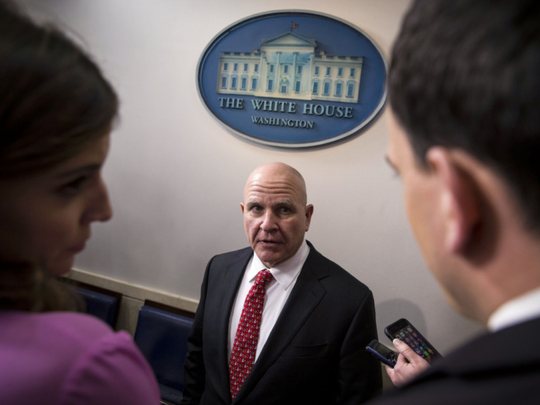
United States President Donald Trump’s National Security Adviser, H.R. McMaster, admitted on Friday that the US president’s approach to foreign policy “has moved a lot of us out of our comfort zone, me included”. The candid remark, just two weeks after McMaster helped launch Trump’s new National Security Strategy (NSS), comes at a time when the president’s plans to deliver his promised dramatic new foreign policy direction are already in shreds.
When Trump moved into the White House in January 2017, he had promised an “America first”, neo-isolationist platform that could have reshaped US foreign and trade policy more radically than at any point since the beginning of the Cold War. That was the time that Harry Truman helped build a consensus around US global leadership.
Since taking office, Trump has had more than 130 meetings and telephone calls with foreign leaders and has indeed made some moves to shift away from this US post-war internationalist orthodoxy — pursued by both Democratic and Republican presidents — such as building US-led alliances to expand the liberal democratic order. He has, for instance, scrapped US involvement in the Trans-Pacific Partnership (TPP) trade deal with key allies in Asia-Pacific and the Americas; withdrawn from the Paris climate deal, agreed upon by more than 170 nations; and launched a review of the North America Free Trade Agreement (Nafta) which may yet collapse in the new year.
The first two of these initiatives were Obama-era signature policies, and Trump has also partially rolled back other key measures from the previous administration, including the Cuba liberalisation initiative; while putting into serious jeopardy the nuclear agreement between Iran and the US, China, Russia, Britain, France and Germany.
But dismantling policies is one thing. Building something new is quite another.
Thus far, the new US administration has failed abjectly to forge any new Trump doctrine, centred around his “America first” vision. And, the new NSS, which McMaster played a key role in formulating, does too little to bring any coherence or clarity to it. The new strategy prioritises four “vital national interests” of protecting the homeland, advancing US prosperity; preserving peace through strength; and advancing US influence. However, while the document stresses “competitive engagement” with allies and foes alike, it also has significant continuity with previous national security strategies, including an emphasis on “preserving the world order that has lifted so many out of poverty and maintained this world order for 70 years”.
The flip-flops
In practice, especially given Trump’s contrarian character, this is likely to lead to further policy incoherence and U-turns in 2018 that have already been observed on issues such as military action in Syria — a departure from Trump’s isolationist campaign rhetoric; and also whether key international institutions like Nato are “obsolete” or not.
These flip-flops reflect not just the ad-hoc nature of the new president’s style of governing, but also the divisions within his team, which could yet be shaken up in 2018, on key foreign policy issues.
Take the example of North Korea, perhaps the most pressing foreign policy challenge that Trump may face in 2018. US Secretary of State Rex Tillerson said last month that he would be willing to “sit down” unconditionally “with Pyongyang and see each other face-to-face”. His remarks prompted the White House to take the unusual step of releasing a statement slapping him on the wrist and attempting to clarify the administration’s position with Trump having previously asserted that Tillerson was wasting his time pursuing dialogue with North Korea.
Trump’s foreign policy stances have already provoked significant global backlash. For instance, a Pew Global poll found this summer that around three quarters of the thousands surveyed internationally had little or no confidence in his global leadership and policies. Indeed, remarkably, Trump already enjoys less support than did former US president George W. Bush at the height of his own foreign policy travails after the controversy of the Iraq invasion in 2003.
Almost a year into office, Trump’s political window of opportunity to put an enduring stamp on US foreign policy is narrowing. His ad hoc style of governing, which regularly exposes lack of experience and knowledge of international issues, risks even greater confusion and incoherence.
Worse still could be potentially serious blunders, especially at a time of crisis.
Given Trump is unlikely to change, and may even become more entrenched in his habits, it is to be hoped that the new strategy helps enable a clearer, more coherent foreign policy that will serve as a compass to help navigate the significant uncertainties of international affairs in 2018 and beyond.
Andrew Hammond is an Associate at LSE IDEAS at the London School of Economics.









